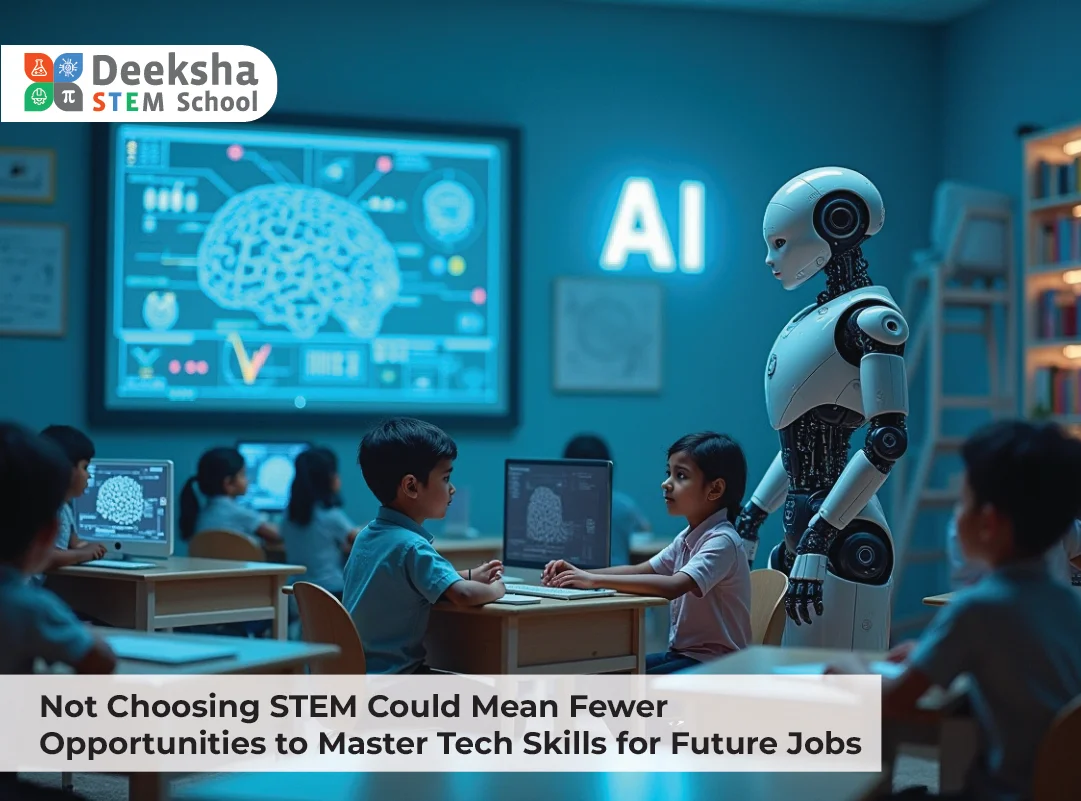Not Choosing STEM Could Mean Fewer Opportunities to Master Tech Skills for Future Jobs

In today’s rapidly evolving world, technology is the driving force behind most industries. From artificial intelligence to renewable energy, the future belongs to those equipped with strong technical skills. However, opting out of STEM (Science, Technology, Engineering, and Mathematics) education can limit access to these critical skills and reduce opportunities for success in a tech-driven job market. At Deeksha STEM Schools, students gain the tools and knowledge to thrive in emerging industries while mastering essential tech skills through an integrated CBSE curriculum.
The Growing Demand for Tech Skills in the Job Market
Tech Dominates the Workforce
- The demand for professionals with expertise in coding, data analysis, and machine learning is skyrocketing across industries like healthcare, finance, and manufacturing. In healthcare, for example, professionals skilled in machine learning are developing predictive models to improve patient outcomes. In manufacturing, data analysis helps optimize production lines and reduce waste.
- Emerging fields such as artificial intelligence, blockchain technology, and quantum computing are reshaping how businesses operate, requiring individuals with advanced STEM skills. These industries not only offer high-paying jobs but also drive global innovation.
- Governments and private sectors worldwide are investing heavily in STEM-related advancements, creating a surge in demand for a skilled workforce capable of leveraging these technologies effectively.
Non-Tech Roles Also Require Tech Proficiency
- Even traditionally non-technical roles now require a basic understanding of technology. For instance:
- Marketing professionals leverage analytics tools like Google Analytics or Tableau to measure campaign performance, analyze consumer behavior, and make data-driven decisions.
- Accountants use advanced software for financial forecasting, auditing, and compliance, such as QuickBooks or SAP, to streamline workflows and ensure accuracy.
- Educators incorporate e-learning tools and platforms to deliver hybrid or fully online learning experiences, demonstrating the intersection of technology and teaching.
- As workplaces increasingly rely on digital tools and platforms, employees across all roles must possess basic to intermediate tech proficiency to stay competitive.
How STEM Education Prepares Students for Future Jobs
Mastering Foundational Skills
- STEM education fosters a strong foundation in problem-solving, logical reasoning, and critical thinking—skills that are transferable across any profession. For example, solving complex mathematical equations or analyzing experimental data trains students to approach problems systematically.
- Subjects like mathematics teach precision and analytical abilities, equipping students with tools to model real-world phenomena, such as calculating trajectories in physics or understanding chemical reactions in biology.
- Physics and chemistry build an understanding of natural laws that underpin modern technology. Concepts such as Newton’s laws of motion or the periodic table become stepping stones for innovations in engineering, robotics, and materials science.
Hands-On Learning
- Practical STEM activities, such as building circuits, programming robots, or conducting experiments, help students apply theoretical concepts to real-world scenarios. For instance, assembling an electric circuit to light up an LED demonstrates the principles of electricity and resistance.
- At Deeksha, students gain exposure to cutting-edge technologies like 3D printing, IoT (Internet of Things), and renewable energy systems through interactive STEM labs. These labs provide a space for experimentation, where students can prototype ideas such as solar-powered devices or smart home systems.
- Hands-on learning fosters curiosity and allows students to see the tangible outcomes of their efforts, encouraging them to delve deeper into STEM fields.
Encouraging Innovation and Creativity
- STEM education nurtures creativity by encouraging students to design solutions for real-world problems, such as creating sustainable energy models or developing apps for community needs. For example, students might work on a project to reduce energy consumption in homes using IoT sensors.
- By working on projects that simulate industry challenges, students gain experience in innovation and teamwork. Activities like designing drones for disaster relief or creating AI-based health monitoring systems teach students to think critically and collaborate effectively.
- Deeksha promotes interdisciplinary projects, where students integrate concepts from multiple STEM fields, such as using mathematical modeling to optimize engineering designs or applying coding skills to automate scientific experiments.
Risks of Not Pursuing STEM Education
Limited Career Options
- Without STEM skills, students may find fewer opportunities in a job market increasingly dominated by technology. Roles in high-demand fields like data science, software development, and environmental engineering may remain inaccessible, limiting career choices to traditional fields that may not offer the same growth potential.
- Individuals lacking tech proficiency may struggle to adapt to workplace technologies, such as cloud computing, machine learning algorithms, or collaborative tools like project management software. This inability to adapt may lead to stagnation in their careers or reduced job satisfaction.
- As more organizations prioritize technological literacy, job seekers without STEM skills may find themselves at a competitive disadvantage, especially in industries undergoing rapid digitization, such as healthcare and education.
Reduced Earning Potential
- Careers requiring STEM expertise often offer higher salaries and significant growth opportunities compared to non-STEM fields. For example, roles in artificial intelligence, data science, and cybersecurity are among the top-paying positions globally.
- Not choosing STEM could mean missing out on lucrative roles in industries such as biotechnology, where professionals design life-saving medicines, or renewable energy, where engineers innovate sustainable solutions to combat climate change.
- Additionally, individuals without STEM skills may find their earning potential plateauing earlier due to limited access to high-demand roles or the inability to transition to emerging sectors that reward technological expertise.
Challenges in Adapting to Technological Advancements
- Rapid technological changes mean that even non-technical roles are evolving to include a tech component. Workers without STEM skills may struggle to keep up with automation tools, advanced data analytics platforms, and digital communication systems, leading to reduced productivity and relevance in the workplace.
- Industries such as retail and hospitality are increasingly relying on automation and AI-driven tools, leaving employees without basic tech knowledge at risk of obsolescence.
- Beyond professional life, lacking STEM literacy can create challenges in personal development, such as navigating digital platforms for education, healthcare, and financial management, which are becoming increasingly technology-driven.
Deeksha’s Approach to STEM Education
CBSE Curriculum with STEM Integration
- Deeksha’s CBSE curriculum incorporates STEM principles, ensuring students gain a comprehensive academic foundation while mastering technical skills.
- Subjects like mathematics and science are taught with a focus on application, helping students understand how concepts translate to technology and innovation.
State-of-the-Art Facilities
- Deeksha STEM Schools feature advanced labs equipped with tools for robotics, AI, and other emerging technologies. Students are encouraged to experiment, innovate, and solve complex problems using these resources.
Guidance from Experts
- With experienced faculty and partnerships with industry leaders, Deeksha provides students with mentorship and exposure to real-world applications of STEM education.
- Workshops, seminars, and hackathons further enhance learning, preparing students for competitive global industries.
The Long-Term Impact of STEM Education
Future-Ready Skills
- STEM education ensures students are prepared for careers in industries that don’t even exist yet. The rapid evolution of technology means that many future professions will require skills that are still emerging today. For instance, expertise in areas like quantum computing, gene editing, and autonomous vehicle engineering will be highly sought after.
- Skills in coding, robotics, and data science are highly adaptable to future innovations. Coding languages, for example, form the backbone of digital applications, while robotics integrates mechanical, electronic, and programming skills to create advanced solutions in automation and manufacturing.
- Through STEM education, students learn to analyze problems and develop innovative solutions, equipping them to thrive in unpredictable and dynamic work environments.
Global Competitiveness
- Students with STEM skills are better positioned to compete on an international stage, contributing to fields like space exploration, sustainable energy, and healthcare technology. For instance, advancements in space exploration require expertise in astrophysics, robotics, and AI to design satellites, rovers, and life-support systems.
- STEM education promotes global awareness by exposing students to universal challenges, such as climate change and public health crises, and equipping them with the tools to address these issues. Collaborating on such challenges fosters cultural exchange and prepares students for diverse work environments.
- Nations that prioritize STEM education often lead in technological advancements, and students trained in these fields can become part of this global leadership, enhancing their personal and professional prospects.
Lifelong Learning and Adaptability
- STEM education fosters a mindset of lifelong learning, encouraging individuals to stay curious and adaptable in a rapidly changing world. This adaptability is critical in industries where technologies and methodologies evolve quickly, requiring continuous skill upgrades.
- The problem-solving and analytical skills gained through STEM learning empower individuals to tackle unforeseen challenges, whether it’s designing a new product or overcoming technical barriers in a project.
- A commitment to lifelong learning also enhances personal growth, enabling individuals to pursue new hobbies or interests in technology, such as app development or renewable energy systems, well beyond their formal education.
- Furthermore, adaptability cultivated through STEM education ensures that students remain resilient in the face of career transitions or shifts in industry demands, making them valuable assets in any workforce.
Conclusion
Choosing STEM education is not just about preparing for a career—it’s about equipping students with the skills and mindset needed to thrive in a tech-driven future. At Deeksha STEM Schools, students gain the knowledge, creativity, and problem-solving abilities to lead in an evolving world. By integrating STEM into the CBSE curriculum, Deeksha ensures that students don’t just follow technological advancements—they drive them. Secure your child’s future by choosing an education that opens doors to endless opportunities.




